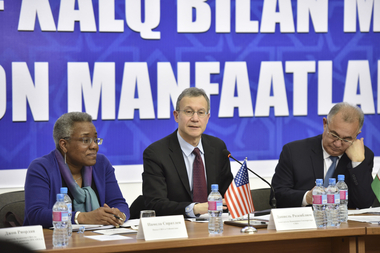A few days after the arrest of a leading opposition politician in Kyrgyzstan, the US State Department replied to a reporter’s query about the incident with a circumspect statement.
“We refer you to the government of the Kyrgyz Republic for information on the details of this case,” the note addressed to Radio Free Europe/Radio Liberty stated.
The note was brief. Yet it was tellingly dismissive, and possibly spoke volumes about the future look of Washington’s human rights agenda under the Trump administration.
Central Asian governments are taking note, given that some of them, in particular Turkmenistan and Uzbekistan, are among the world’s most serial violators of political, religious and media freedoms.
A broader signal was given at the start of March when Secretary of State Rex Tillerson elected not to attend his department’s annual launch of its reports on human rights conditions around the globe.
“Secretary Tillerson’s absence from the State Department’s annual human rights report release reinforces the message to governments, rights activists and at-risk minorities that the State Department might also be silent on repression, abuse, and exploitation,” Sarah Margon, Washington Director at Human Rights Watch, said in a statement on March 3.
As the State Department’s own reports document, there is a dearth of governmental respect for many basic rights in Central Asia. The annual surveys are, by design, intended to avoid explicitly indicating nation’s trajectories — if they are getting better or worse — but the proliferation of problem cases is telling in itself.
Taken individually, each country in the region presents its own set of rights challenges — ones that a distracted and underfunded State Department may struggle to meet.
If the United States ignores its national interest in promoting basic individual rights around the world, authoritarian political systems are sure to grow stronger. By not paying attention to the region now, then, the United States might be creating more complicated diplomatic problems for itself later in Central Asia and elsewhere, suggested Surat Ikramov, a prominent rights activist in Uzbekistan.
“For the countries of Central Asia, and for Uzbekistan, the consequences will be significant. This means a strengthening of dictatorial regimes, a deepening of corruption, a worsening in the standard of life of the population, and an increase in emigration,” Ikramov told EurasiaNet.org.
Tajikistan presents a particular challenge for US diplomacy in that it is run by a weak strongman, according to EurasiaNet.org. Washington has pursued a diplomatic course there that is intensely focused on security, given that Tajikistan shares a long and poorly defended border with Afghanistan. Accordingly, US diplomats have remained largely silent in response to escalating repression against opposition politicians and independent journalists. The Tajik crackdown picked up steam in September 2015, when authorities claimed they had been targeted by a reported coup attempt.
In recent months, in another surprising turn of events, a long-time loyalist was removed as mayor of the Tajik capital, Dushanbe. The US Embassy has made no public comment on the case, although Ambassador Elisabeth Millard did on March 7 meet with his successor, Rustam Emomali, who is also the president’s son.
The challenge for Washington vis-a-vis Kyrgyzstan is to get bilateral ties back on track. Bilateral relations fell off a cliff in mid-2015, when the State Department decided to bestow a human rights award on a jailed ethnic Uzbek activist — an act that Bishkek perceived as a hostile gesture. Rights-related issues have collectively acted as the single greatest irritant in US-Kyrgyz ties.
Once rights are removed from the table — or at least shoved to one side — prospects seem to get better for improved bilateral relations, some observers believe. But such action would come at a cost – undermining the US image as an advocate for justice, EurasiaNet.org reports.




